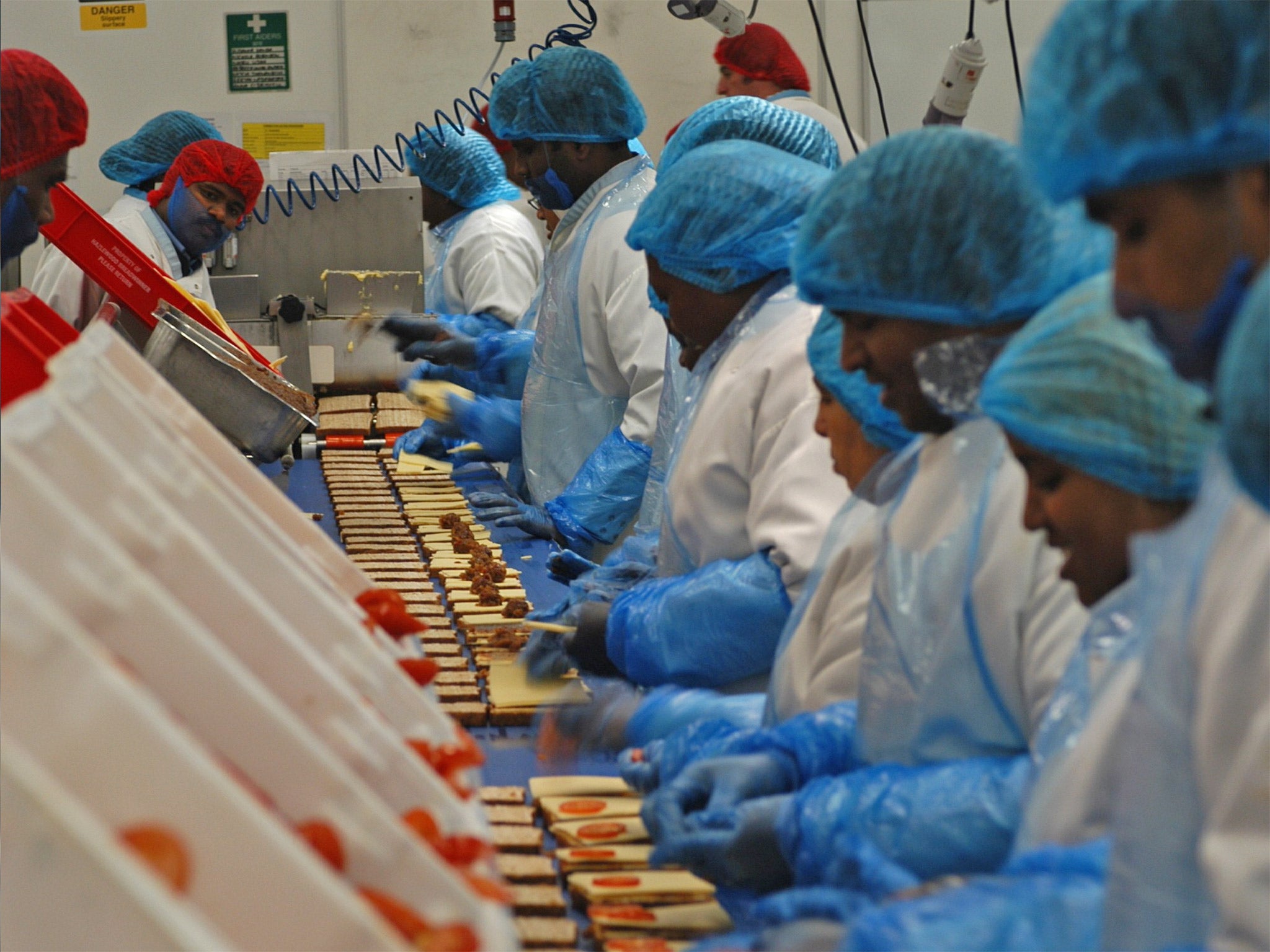So who gives us our daily bread? Not British workers, according to a story making the headlines this week
But, says Laura Chesters, migrant labour has traditionally been the filling in the middle of the sandwich industry

The factory workers at Park Royal turned up for their usual 2am shift, scrubbed down and hair nets donned. These workers, from 49 countries, make the sandwiches you buy in Marks & Spencer, the ready meal from Tesco or even the quiche from Waitrose.
Their employer, Greencore, runs 15 food-manufacturing sites in the UK and employs more than 10,000 people but it was its recruitment tactics for a new Northampton site that prompted a spate of stories about #sandwichgate on the internet this week.
Greencore is hiring cleaners, porters, quality controllers and sandwich makers at its new £30m site, which will open in 2016. But when its HR director, Allyson Russell, told the BBC last week that some of its 250 new staff members would be recruited from Hungary because there is “very low unemployment” in Northampton the news was met with outrage.
Some claimed Greencore should pay more to attract local workers, others – including the Euwork employment agency in Budapest – said Britons did not want to do this kind of work.
It is a tough job. Production-line staff on the factory floor start on the minimum wage of £6.50 an hour for the first three months, with potential increases after this probation period. Currently 10 per cent of Greencore’s staff are on the minimum wage. Shifts – worked standing up at the relentless conveyor belt of bread and fillings – are typically eight hours. That’s 40 hours over 5 days. But those who want overtime will have to work much longer days.
And we are not talking 9am to 5pm. Shifts can start very early in the morning, or well into the evening, depending on the plant. Many of Greencore’s facilities are 24-hour – to make sure that the sandwich you are buying in the shop is fresh.
The diversity across Greencore’s workforce is plain to see at any of its factories. Walls are plastered with notices in a variety of languages and a Greencore spokesman says it is “extremely proud of the diversity of its workforce” and has “for many years recruited staff both locally and from further afield”.
It isn’t the only firm to see the attractions of migrant workers. Even in Poundsbury, Dorset, the embodiment of Prince Charles’s vision for modern living, migrants are multiplying. Dorset Cereals, based in Poundbury since 2000, has a factory reliant on workers from continental Europe, who are bussed in daily from Weymouth and further afield. On a recent visit, notices in English and Polish were evident on the walls, and English courses were provided for workers.
Greencore’s jobs drive in Northampton isn’t the first time sandwiches and migrants have hit the headlines. Two years ago the café chain Pret-a-Manger came under fire for favouring overseas workers: only about one in five of its workers are born in Britain.
Migrant workers have long been needed in the UK’s manufacturing and food industry. The Gangmasters Licensing Authority, which regulates the supply of workers to the agricultural and fresh-produce industries, including food processing and packaging, said: “The use of migrant workers is certainly not new or unusual in our sector.”
The food and drink sector employs more than 400,000 people in the UK and often an immigrant to Britain will start in a minimum-wage job but will then gain experience, learn English and eventually move into other work.
The industry magazine Food Manufacturer laid out the importance of migrants last week with an article entitled “Migrants are vital to the UK’s food industry”.
Angela Coleshill, director of Employment and Skills at the Food and Drink Federation, said: “The food and drink industry is reliant on being able to supply resources, sometimes at short notice. This includes creating seasonal and short-notice placements to meet needs across the UK.
“In some cases… it creates opportunities for migrant workers to fulfil a range of roles and make a valuable contribution to the industry.”
The contribution that immigrants have made to the British economy was laid out last week by a report from researchers at University College London (UCL).
It found that European immigrants who have arrived in the UK since 2000 contributed more than £20bn to public finances between 2001 and 2011. It also found that immigrants from the 15 countries that constituted the EU in 2000 contributed 64 per cent more in taxes than they received in benefits, while immigrants from the central and east European “accession” countries contributed 12 per cent more than they received.
Professor Christian Dustmann, co-author of the UCL study, said: “A key concern in the public debate on migration is whether immigrants contribute their fair share to the tax and welfare systems. Our new analysis draws a positive picture of the overall fiscal contribution.”
It isn’t just unskilled jobs that are up for grabs for overseas recruits. Skilled workers are in demand for a number of sectors in the UK including science, engineering, manufacturing and technology.
The manufacturers’ organisation, the EEF, said recently that manufacturers “rely on the recruitment of non-EEA graduates [ie those from outside the European Economic Area] to meet their skills needs.”
While the debate on jobs and immigrants will continue to rage in the run-up to the next election the workers at Greencore can be relied upon to churn out sliced bread with prawn mayonnaise and egg cress just in case the rest of us really don’t know how to make a sandwich.
Join our commenting forum
Join thought-provoking conversations, follow other Independent readers and see their replies
Comments